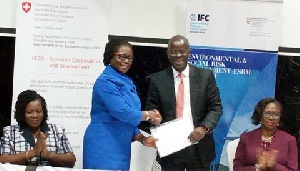 With the ERSM Ghana affirms its position in the Sustainable Banking Network
With the ERSM Ghana affirms its position in the Sustainable Banking Network
The Bank of Ghana and International Finance Corporation (IFC), a member of the World Bank Group, have signed a cooperation agreement to provide technical support for organisational strengthening at the central bank, and development of Environmental and Social Risk Management (ESRM) guidelines for BoG and the banking industry.
Under this agreement, the IFC is also expected to assist in identification of sustainable lending opportunities and practices in Ghana, while it supports the central bank in implementation of the ERSM guidelines and also develops monitoring procedures to supervise ERSM.
This agreement comes at a time that central banks around the world have adopted, sound environmental and social practices as part of Sustainable Banking Principles (SBP).
With the ERSM Ghana affirms its position in the Sustainable Banking Network, an IFC-supported global knowledge platform for financial sector regulatory agencies and banking associations from emerging markets which promotes a shift in how the financial sector contributes to environmental and social goals.
Speaking at the sidelines of the sustainable Banking Principles Stakeholders Forum in Accra, the Second Deputy-Governor of the Bank of Ghana, Mrs. Elsei Addo Awadzi, said sustainable banking is gradually gaining prominence across the globe – with increasing realisation that preserving the environment is vital for maintaining sustained growth of economies.
“Higher standards of environmental and social risk management by financial institutions are a powerful way to manage concrete business risks, increase market trust, and attract investment – especially toward green financing. We are proud to connect SBP as set by the regulator and members at this forum to share experience on this journey toward sustainable finance.”
She said it is therefore incumbent on financial institutions to have Environmental and Social Risk Management programmes imbedded in their operations.
Mrs. Awadzi also disclosed that the collaboration of BoG with the Ghana Association of Bankers (GAB) and Environmental Protection Agency (EPA) is proposing some seven principles which affect five relevant sectors of the Ghanaian economy.
The five sectors are as follows: Manufacturing, Energy and Power, Construction and Real Estate, Mining, Oil and Gas, and Agricultural and Forestry.
Ghana’s banking sector, particularly indigenous financial institutions, are said to be in distress due to weak capital adequacy and loans that have gone bad – most of which were said to have gone to the Energy and Power, Oil and Gas and Agricultural and Forestry sectors.
Late last year Capital Bank and UT Bank collapsed, with their assets being acquired by GCB Bank. This was followed by last week’s takeover of UniBank Ghana by the central bank, after it was declared insolvent.
According to the Bank of Ghana, several financial institutions – including some 272 Rural and Community Banks as well as Microfinance Institutions – are currently in distress.
IFC, which has signed an agreement with the Bank of Ghana, over the years has led the move from normal banking to sustainable banking – backing regulators in its efforts of providing its technical expertise and sharing experience in implementing the IFC’s environmental and social performance standards, which have become a global benchmark for finance in emerging markets.
The EESRM programmes are implemented in partnership with Switzerland’s State Secretariat for Economic Affairs (SECO) and other partners.